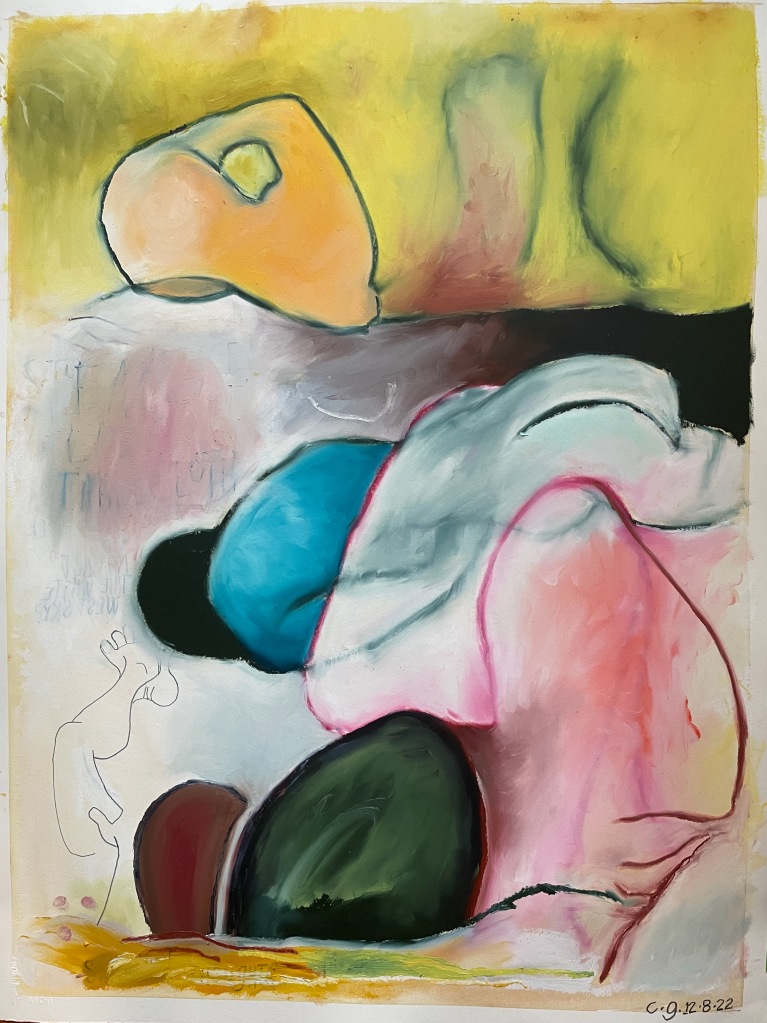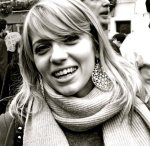
In this story, day zero is when I live, and you die. It’s the day when I pack our stuff and go back home; I can barely move. You can’t. You’re dead. I already left you behind.
I took your toothbrush, your pajamas; one of your books, which I never read, and one of your notebooks — I threw it away. My dad helped me. We went through your things, selected them carefully; we took what we could have used, and got rid of the rest. Your mom didn’t come. It’s been years since I’ve seen her, she left when you died. Your story ended without her last goodbyes. My own started without her.
Your funeral lasted for a long time: days, weeks. It ended and started all over again. Different people came, and some came back; others stopped by and then never showed up again. Friends came home and stayed for months: they were by themselves, or in pairs, in groups, or alone. None of them really knew how you died. We sat around a table; I was very weak. We had lunch, dinner, and always smoked a lot: in the dim, soft light, the tiny flickers of red embers lit up and went out. The smoke emerged from black mouths and seemed to outline faces that I had never seen before. Sometimes we were quiet, other times, we talked for a long time, almost never about you. At your funeral, it was easy: no one suspected anything, or asked any questions. I was needy, frail, and alive; our friends were there for me, and no one was really interested in your death anyway. Every night, they took turns to take care of me, the one who lost you. I couldn’t stand that they would watch me sleep for some reason that wasn’t about me, but about you, who were now dead. I started lying, told people that someone else would come by soon, and finally, after a while, no one showed up anymore.
When I got bored, I danced by myself, reliving your end. That night it was the talk of the town, and I replayed every detail, imagined every single one of your moments of pain, every instant of torture and fear. Everyone talked about it, but only I knew those moments. I dreamed of a solemn funeral, requiems echoing in huge churches, the warm, colorful light of cathedrals. I smiled and pitied you: in truth, at your long funeral no one actually ever thought about you. I saw myself in a long, dark dress with a deep cut, my hair up, my eyes bright with black and silver makeup. I imagined the men you had loved, and they were crying; they looked at me, squeezed me. I wanted some of them too: in my fantasies, their hands ran across my back, caressed my breast, reached my belly; their desire slid down, and I offered myself, letting them wrap themselves around me.
One day I decided to open your suitcase. It was from one of your last trips to the desert, and it had remained there, in a corner, since the night you died. I was so apathetic, as I rummaged through your trinkets; you always had so many with you. I melted the sugar cubes shaped like snakes: I broke their tail, their head, put them in hot water and then threw it away without drinking it. I detached the colorful, round pinheads from your needles — you had so many: the women you had met wore them on their heads to fix their covers. I took your cotton stationery paper, slid my lighter over it; you were so silly: it just burned, just like regular paper.
Then I found your taped notebook. I didn’t know it was there. It was an important one. I ran my hand across the sticky bands on the cover and I remembered the day you got it bound. You gave it to a man on the street. The old man used a strange tool to wrap it in transparent strips, both vertically and horizontally, like a mosaic. He gave it back to you, tilting his head, taking his left hand to his heart. He thanked God in a foreign tongue. You understood and answered in the same language.
I leafed through the notebook from the last page to the first, as I remembered you did when you read it. You had taken notes for months, and guarded it jealously. I tried reading it once, then tried again. I didn’t get it from right to left; I tried again, from right to left: nothing. I tried from left to right, maybe this was an exception: nothing. You had studied that language for years, “God’s language,” as its speakers called it, those people who taught it to you. I closed my eyes, then opened them again: the round letters looked like evil faces that stared at me in silence and laughed at me. I tried again: from right to left, again, from right to left: nothing. They remained mute.
I tore every page four, six, eight times. I threw myself on your suitcase: I shredded your books, burned your letters, destroyed everything you took from the desert. Whatever I had feared had eventually happened: you managed to cheat death until the very last. You were dead, I was alive, but as you left, you took with you everything that really mattered. I thought of hating you as much as you deserved, but it wasn’t possible. All the hatred I could muster wouldn’t be enough for all the ferocious anger that I felt towards you.
Like every story, this has a beginning, an ending, and a precise timeline between the two. For some stories, the beginning is important, for others, it’s the ending that truly matters; in this one, so many things happened in between, but many of those, as the end came, seemed to get lost in the beginning.
Not long after I opened your suitcase, I left. Your death made me rich and I left the place where I was born and you died. The events happened like small dots lighting up and blowing out. I lived in a big city. I met a lot of people. I had sex with many more men than you ever went out with. I traveled in the desert, just like you. I saw crystal skyscrapers among sand dunes, a bridge that was dozens kilometers long and was made of hundreds of dams one next to the other. They reached into the bottom of the Persian Gulf and joined two sand plains, so wide, and so rich. I walked above them, and I really thought that I’d know all the places that you, who were dead, would never see.
Every day I looked at myself in the mirror and I saw you again as you smiled at your perfect symmetries. The big eyes, the aligned cheekbones, the upturned nose. I looked at the old pictures and I hated you: I would have never been more beautiful than you. As I ran a finger on my face, I wrote the alphabet of God’s language. I dreamed of disfiguring you in its crooked, ungraceful lines.
After ten years, I went back to the place where you died. It had been a long time. I was tired. I walked through the hospital and reached the courtyard, where our friends took us walking. I sat on a bench. The entrance to the ward was right in front of me.
I saw you again. You were propped against the courtyard’s gate to hold yourself up. I saw you smiling and nodding when you couldn’t follow the conversation with whoever had come to see us.
I repeated one of the many words that I had started studying again. One, two, three: I put them together in a sentence. The language that I had forgotten was coming back. I got closer, and talked to you.
Do you remember all the hard work we put into going down the stairs of the ward, or listening to the conversations of those who visited us? In the courtyard, our friends stepped away to smoke a cigarette, and even though they were far away, we struggled to breath. Who knows if you were still alive then. You talked about your travels, about the language that you had studied; you said that you’d leave again soon, and you didn’t really care for those who looked at you with pity.
Maybe you didn’t die on that night of violence. Maybe I didn’t kill you, even at the hospital. Maybe I decided that we were two different people when I went back home, when my father helped me, and my mother never came back, when friends came to see me for months and took care of me. When I realized that everyone would forget, and life would go on.
Time is a strange thing; it doesn’t work like I thought. I was sure that stories began one day and finished another, and the day when I left the hospital was the day when you died, and I was born. Now I know I was wrong. There are no beginnings and no endings: there’s only moments that define our story. I blink and I see you, right from the start: younger, happier, prettier. Other than that, we’re not that different.
I wave you off, my arms up as they trace a zero around me, just like the day of the beginning of this story. I smile: I’m so silly. I didn’t draw a zero, but a circle. It’s a circle, and it’s round. In the middle, there’s me.
Il giorno 0
Il giorno 0 di questa storia è il giorno in cui io vivo, e tu muori. È il giorno in cui impacchetto le nostre cose e torno a casa, mi muovo a fatica. Tu invece no, sei morta. Ti ho già lasciata indietro.
Ho preso il tuo spazzolino, il tuo pigiama; un tuo libro che non ho mai letto e un tuo quaderno che ho buttato via. Mio padre mi ha aiutata. Abbiamo cercato tra le tue cose, le abbiamo selezionate con cura; abbiamo preso quello che ci sarebbe servito e abbiamo buttato il resto. Tua madre, invece, no. Sono anni che non la vedo, se n’è andata quando sei morta. La tua storia è finita senza il suo saluto. La mia è iniziata senza di lei.
Il tuo funerale è durato a lungo: giorni, settimane, finiva e ricominciava. Le persone cambiavano, alcune tornavano; altre venivano una sola volta e poi mai più. Gli amici sono venuti a casa per mesi: arrivavano spaiati o in coppia, in gruppo o da soli. Nessuno di loro sapeva bene com’eri morta. Sedevamo intorno a un tavolo, io ero molto debole. Pranzavamo, cenavamo, fumavamo sempre molto: nella luce bassa e soffusa, puntini di braci rosse si accedevano e spegnevano. Il fumo usciva da bocche nere e creava volti che non avevo mai visto. A volte stavamo in silenzio, altre volte parlavamo a lungo. Quasi mai di te. È stato facile durante il tuo funerale: nessuno sospettava né faceva domande. Io ero bisognosa, debole e viva, i nostri amici erano lì per me e a nessuno interessava davvero la tua morte. Venivano a turno, ogni notte, a prendersi cura di me che ti avevo persa. Non sopportavo che mi guardassero dormire per una ragione che non ero io ma tu, che eri morta. Ho cominciato a mentire dicendo ad alcuni che sarebbero venuti altri e finalmente, dopo un po’, nessuno è venuto più.
Quando mi annoiavo, ballavo da sola rivivendo la tua fine. Quella notte era sulla bocca di tutti, e io inscenavo ogni particolare, immaginavo ogni tuo momento di dolore, ogni attimo di strazio e di paura. Tutti ne parlavano, ma solo io li conoscevo. Sognavo un funerale solenne, requiem che si diffondono in grandi chiese, la luce calda e colorata delle cattedrali. Sorridevo e ti compativo: in verità nessuno, al tuo lungo funerale, aveva neanche mai pensato a te. Mi vedevo in abito lungo e scuro, lo scollo profondo, i capelli raccolti e gli occhi illuminati da un trucco nero e argentato. Immaginavo gli uomini che avevi amato che piangevano, mi guardavano, mi stringevano. Alcuni di loro li volevo anch’io: nelle mie fantasie le loro mani scendevano lungo la mia schiena, carezzavano il petto, raggiungevano il ventre; il desiderio scendeva verso il basso e io gli cedevo il bacino, lasciando che mi avvolgessero.
Un giorno ho deciso di aprire la tua valigia. Era quella del tuo ultimo viaggio nel deserto, e dalla notte in cui eri morta era rimasta lì, in un angolo. Indolente, ho frugato tra le tue cianfrusaglie; ne avevi sempre tante con te. Ho sciolto le zollette di zucchero a forma di serpente: gli ho spezzato la coda, la testa, le ho messe nell’acqua calda e poi l’ho buttata, senza berla. Ho staccato la capocchia colorata e rotonda degli aghi, ne avevi tanti: le donne che avevi conosciuto li portavano sulla testa, per sistemare i veli. Ho preso la carta da lettere di cotone, ci ho passato sopra l’accendino; che sciocca che eri: bruciava anche lei, come la carta.
Poi ho trovato il tuo quaderno di scotch. Non ricordavo fosse lì. Era importante, quello. Ho passato la mano sopra le fascette adesive della copertina e sono tornata al giorno in cui lo avevi fatto rilegare. Lo avevi dato a un uomo sulla strada. Con uno strano strumento, il vecchio lo aveva ricoperto di strisce trasparenti, verticali e orizzontali, come un mosaico. Te l’aveva reso inclinando il capo, portandosi la mano sinistra al cuore. In una lingua lontana, aveva ringraziato Dio. Tu avevi capito e, in quella sua stessa lingua, avevi risposto.
L’ho sfogliato dall’ultima pagina alla prima, come ricordavo che facevi per leggerlo. Ci avevi preso appunti per mesi, lo avevi conservato gelosamente. Ho provato una volta, poi un’altra. Da destra a sinistra, non capivo; di nuovo, da destra a sinistra: niente. Ho provato da sinistra a destra, magari era un’eccezione: nulla. Avevi studiato quella lingua per anni, la “lingua di Dio”, come credeva chi la parlava e te l’aveva insegnata. Ho chiuso gli occhi, li ho riaperti: le lettere ricurve erano volti maligni che mi guardavano in silenzio e ridevano di me. Ho riprovato: da destra a sinistra, di nuovo, da destra a sinistra: niente. Sono rimaste mute.
Ho strappato ogni pagina quattro, sei, otto volte. Mi sono gettata sulla tua valigia: ho fatto a pezzi i tuoi libri, ho bruciato le tue lettere, ho distrutto tutto quello che dal deserto avevi portato con te. Era successo quello che avevo temuto: fino all’ultimo eri riuscita a scamparla. Tu eri morta, io ero viva, ma andandotene ti eri portata via tutto quello che contava davvero. Avevo pensato di odiarti quanto ti meritavi. Non era possibile. Tutto l’odio di cui ero capace non sarebbe mai stato abbastanza per la rabbia feroce che provavo per te.
Come tutte le storie, questa ha un inizio, una fine e un tempo preciso tra l’uno e l’altra. Per alcune storie è importante l’inizio, per altre la fine; in questa, nel tempo di mezzo, sono successe tante cose ma molte di queste, arrivate alla fine, si sono perse nell’inizio.
Poco dopo aver aperto la tua valigia, sono partita. La tua morte mi aveva reso ricca e ho lasciato il luogo dove ero nata e tu eri morta. Gli eventi si sono succeduti come puntini che si illuminavano e si spegnevano. Ho vissuto in una grande città. Ho conosciuto tante persone. Ho fatto sesso con più uomini di quanti tu ne abbia mai frequentati. Ho viaggiato nel deserto, come te. Ho visto i grattacieli di cristallo tra le dune, un ponte lungo decine di chilometri fatto di centinaia di dighe, una attaccata all’altra, che entravano nei fondali del Golfo Persico e univano due distese di sabbia grandi e ricchissime. Ci ho camminato sopra, e ho pensato davvero che avrei conosciuto tutti i luoghi che tu, che eri morta, non avresti mai visto.
Mi sono guardata ogni giorno allo specchio e ti ho rivista sorridere nelle tue simmetrie perfette. Gli occhi grandi, gli zigomi allineati, il naso all’insù. Ho riguardato le foto di un tempo e ti ho odiata: non sarei mai più stata bella davvero. Passandomi un dito sul viso, scrivevo l’alfabeto della lingua di Dio. Sognavo di sfregiarti con le sue linee storte e sgraziate.
Dopo dieci anni sono tornata nel luogo dove eri morta. Era passato tanto tempo. Ero stanca. Ho attraversato l’ospedale e sono arrivata al cortile interno dove gli amici ci portavano a camminare. Mi sono seduta su una panchina. L’ingresso del reparto era di fronte a me.
Ti ho rivista appoggiarti al cancello del cortile per non cadere; sorridere e annuire, quando non riuscivi a seguire le conversazioni di chi ci veniva a trovare.
Ho ripetuto dentro di me una qualunque delle parole che avevo ricominciato a studiare. Una, due, tre: le ho messe insieme in una frase. La lingua che avevo dimenticato stava tornando. Mi sono avvicinata, ti ho parlato.
Ti ricordi la fatica che facevamo a scendere le scale del reparto, ad ascoltare le conversazioni di chi ci veniva a trovare; nel cortile gli amici si allontanavano per fumare una sigaretta e noi, pure da lontano, faticavamo a respirare. Chissà se eri ancora viva, allora. Parlavi dei tuoi viaggi, della lingua che avevi studiato; dicevi che saresti ripartita presto e a chi ti guardava con compassione non facevi caso.
Forse non sei morta in quella notte di violenza. Forse non ti ho uccisa nemmeno in ospedale. Forse ho deciso che eravamo due persone diverse quando sono tornata a casa. Quando mio padre mi ha aiutata, mia madre non è più tornata; gli amici sono venuti a trovarmi per mesi e si sono presi cura di me. Quando ho realizzato che tutti avrebbero dimenticato, che la vita sarebbe andata avanti.
Il tempo è una cosa strana; non funziona come credevo. Ho sempre pensato che le storie iniziassero in un giorno e finissero in un altro, e che il giorno in cui io lasciavo l’ospedale era il giorno in cui tu morivi, e io nascevo. Ora ho capito che mi sbagliavo. Non ci sono inizi e non ci sono fini: ci sono solo momenti che definiscono la nostra storia. Sbatto gli occhi e ti vedo, dalla parte del prima: più giovane, più allegra, più bella. A parte questo, non siamo poi così diverse.
Ti saluto e alzo le braccia. Per farlo disegno uno 0, intorno a me, come il giorno dell’inizio di questa storia. Sorrido: che stupida. Non ho disegnato uno 0, ma un cerchio. È un cerchio ed è pieno. E al centro ci sono io.
✶✶✶✶

Enrica Fei is a research fellow and PhD candidate in International Relations at the Bundeswehr University in Munich, Germany, focusing on Shia identity and post-2003 Iraqi relations with Iran. Previously, she worked at the Institute of Arab & Islamic Studies of the University of Exeter, UK, and as a consultant for a Washington-based risk consulting firm. She has lived and conducted research in Iraq, Iran, Kuwait, Bahrain and other countries of the Middle East. She translates from Arabic, French and English. She writes for a variety of Italian magazines. Her short stories, translations, book reviews and articles have been published in Minima & Moralia, L’Inquieto, Quarta Corda, Arabpop, amongst many others. She is the book reviews section editor at Yanez Magazine.
✶

Rachele Salvini is an Italian woman based in the US. She has spent most of her life in Italy, and she writes both in English and Italian. Her work in English has been published in Prairie Schooner, StorySouth, Monkeybicycle, Moon City Review, and others. She earned her PhD in Creative Writing at Oklahoma State University, and currently lives in Pennsylvania, where she is the Emerging Writer Lecturer at Gettysburg College.
✶

Char Gardner is a visual artist and creative nonfiction writer, who taught in the Washington, DC area for nearly twenty years before she began working with her husband, Rob Gardner. Together they made documentary films internationally for over thirty years. Now retired, they live in the Green Mountains of Vermont, where Char is at work on a memoir. Her recent drawings are made with oil sticks on Arches 22X30 paper. Imagery is derived from the human form (working directly from a live model) and from the surrounding natural world. Her essays have been published in The Gettysburg Review, Green Mountains Review, and elsewhere. She received the Carol Houck Smith award from The Bread Loaf Writers’ Conference in 2013.